Tracey Warr's Blog, page 5
June 20, 2024
French Historical Fiction Summer Reading
Set in France that is, rather than written in French.
My novels in the House of La Marche series are part of this promotion, which runs until the end of July
https://books.bookfunnel.com/FrenchHistoricalFictionSummerReading/fpa4u298b9
June 10, 2024
Tea and Female Lords
I was invited to talk about medieval Occitan female lords at a delightful tea party this week with 12 women who all live near me in southwest France. The sun dappled the table shaded by vines and wisteria, the teacups chinked delicately, the apple and rosemary cake melted on the tongue, wild flowers burgeoned and discussion scintillated.
I spoke about how 10-12% of lords in the 10th-12th centuries in the Occitan-speaking territory (now southern France) were female. The Occitan female lords ruled castles, cities and counties. Some of them led armies into battle. They were called domnas (female lords) in the Occitan language.
My hostess asked me to focus on local medieval women, so I mostly spoke about the female lords in and around Toulouse and Carcassonne (including Adelaide-Blanche of Anjou, Ermessende of Carcassonne, Almodis of La Marche, Raingarde of La Marche, Lucia of La Marche, Ermengard of Carcassonne). I did search for someone really local, but the best I could come up with was this 15th century book about life in Laguepie, a few miles from where we were drinking tea – not about female lords, but full of delightful images of life in the Middle Ages.
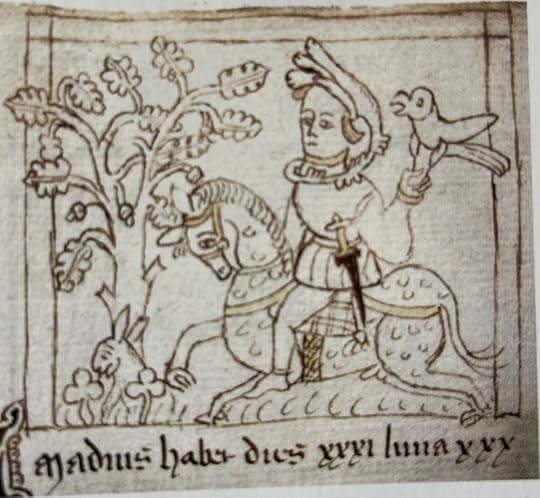 Terrier de Laguepie, 15th century. Source: Christian-Pierre Bedel (2016) Histoire et Traditions Occitanes de Tarn-et-Garonne, al canton, p. 293.
Terrier de Laguepie, 15th century. Source: Christian-Pierre Bedel (2016) Histoire et Traditions Occitanes de Tarn-et-Garonne, al canton, p. 293.Some of these female rulers were regents – standing in place of their sons, who were minors, or in place of their husbands, who had died or were away on crusade. Some inherited in their own right when there was no son to do so. The female lords who were heiresses in their own right often had to contend with husbands, uncles and nephews who wanted to usurp their power. This was the case for Philippa of Toulouse (1073-1118), Ermengard of Narbonne (1127-1197), and Marie of Montpellier (1182-1213). Countess Beatrice of Mauguio (1130-1190) disinherited her own son when he tried to usurp her title.
I am presenting a talk on Almodis of La Marche, countess of Toulouse and Barcelona, and her two sisters, Raingarde, countess of Carcassonne, and Lucia, countess of Pallars Sobira, as part of the Occitan University on Friday 19 July, 9pm at Château de Saint-Martin-Laguépie, 81170, France. I’m also running a ‘Be Your Own Troubadour’ workshop where you can write your own troubadour vida (boastful biography) and tenso (argument poem in two voices about love).
More information: http://www.lengaviva.com
https://www.facebook.com/groups/21846609750/user/100076116229213/
or contact me at info@meandabooks.com
Sources
Aurell, M. (1994) Les Noces du Comte: Mariage et Pouvoir en Catalogne (785–1213), FeniXX.
Cheyette, F. L. (2001) Ermengard of Narbonne and the World of the Troubadours, Cornell University Press.
Débax, H. (2013) ‘Le lien d’homme à homme au féminin: Femmes et féodalité en Languedoc et en Catalogne (XIe–XIIe siècles)’, Etudes Roussillonnaises: Les Femmes Dans L’Espace Nord-Méditerranéen, 25, pp. 71–82.
LoPrete, K. A., & Evergates, T. (1999). ‘Introduction’. In T. Evergates (Ed.), Aristocratic Women in Medieval France (pp. 1–6). University of Pennsylvania Press.
Mundy, J. H. (1954) Liberty and Political Power in Toulouse 1050–1230, Columbia University Press.
Paterson, L. M. (1993) The World of the Troubadours: Medieval Occitan Society, c. 1100–c.1300, Cambridge University Press.
June 3, 2024
Treading the Ground: Researching for a Medieval Novel
I’ve just returned from a research trip to Narbonne, Carcassonne, Aigues-Mortes, and Conques. There’s nothing like treading the ground to inspire writing. I thought a photo-journal of the trip might be of interest for some of you.
NARBONNE
I am giving a couple of talks on medieval Occitan female lords over the next few months. 10-12% of lords in Occitania (southern France) in the 11th century were female. My visits to Narbonne and Carcassonne were related to preparing for those talks. Ermengard, viscountess of Narbonne; Ermessende of Carcassonne, countess of Barcelona; and Raingarde de La Marche, countess of Carcassonne, are among the female lords I am researching.
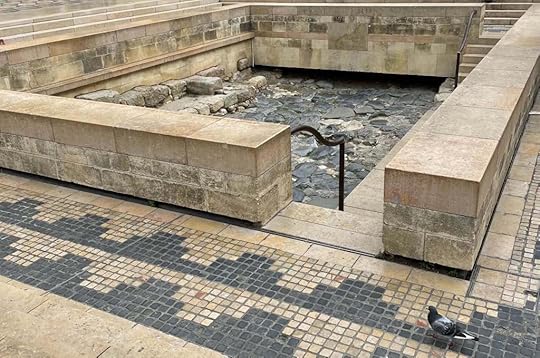
A section of the Roman road, the Via Domitia, exposed in front of the archbishop’s palace in Narbonne. In the medieval period, the Roman roads were still among the best ways to travel.
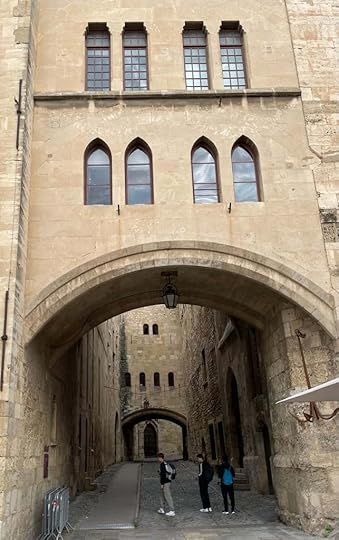
The Passage de l’Ancre (anchor) in Narbonne runs between the new archbishop’s palace (14th-18th centuries) on the left and the old one (9th-13th centuries) on the right. You can see an anchor hanging at the entrance. The name signified the archbishop’s right to collect port and fishing taxes.
CARCASSONNE

I am giving a talk about Raingarde and her sisters, Almodis de La Marche and Lucia de La Marche as part of the Occitan University at the Lou Viel Chateau, Saint-Martin Laguepie 81170, Friday 19 July 9pm. With the assistance of my collaborator, Amandine Rey, the talk will be in English and French. The participants in our workshop on making your own troubadour songs will also present their creations.
AIGUES-MORTES
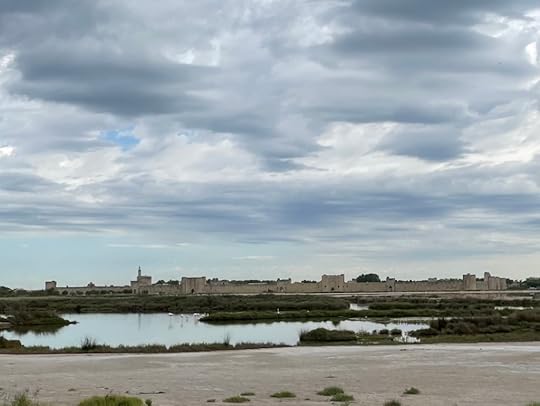
I travelled to the walled town of Aigues-Mortes to find out about medieval salt production. I am setting a scene in my new novel, Love’s Knife, in Aigues-Mortes. The medieval salt trade plays a significant role in the plot of this story, and in the second book in the series, where my characters will be travelling into the Pyrenees and the Iberian kingdoms.
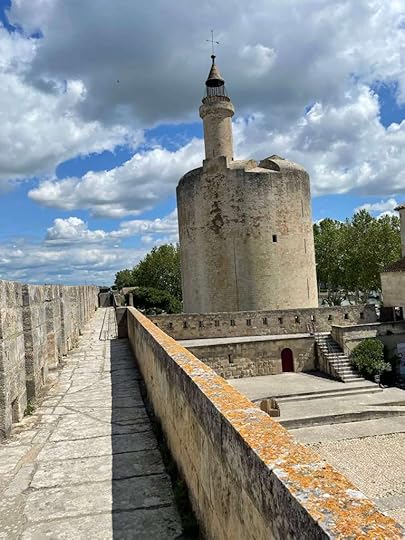
I walked around the city ramparts, which gave great views down into the city and out across the pink salt lakes. The Constance Tower, seen here, was built by King Louis IX in 1242. It replaced an earlier defensive tower built in 791 by Charlemagne to protect the saltworks.
Inside the city, the air was full of the jasmine that was flowering everywhere.
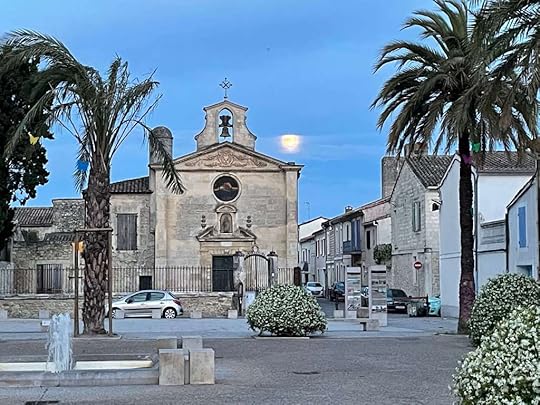

Beyond the city walls, a vast system of shallow lakes allowed for evaporation and the formation of salt in pink-tinged pools where flamingoes waded.
The Salt Museum had a collection of tools and baskets for collecting the salt, which probably were similar in the medieval period.
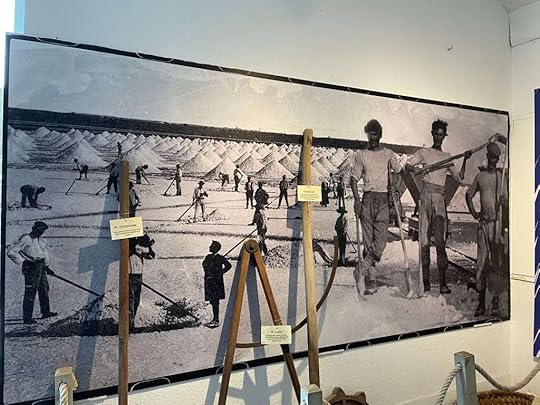
CONQUES

Conques Abbey on one of the pilgrim routes to Compostela. Conflicts between the pope and the monastery of Cluny over the developing pilgrim routes are also significant to the plot of Love’s Knife. Toulouse and Conques were both part of this conflict.
A scene in Love’s Knife takes place in Conques. The novel will be published on 2 September and is on pre-order now.
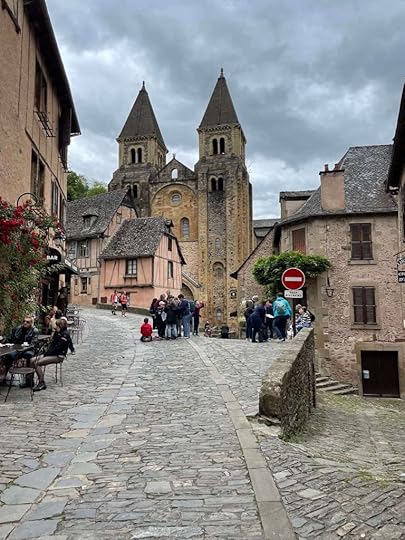
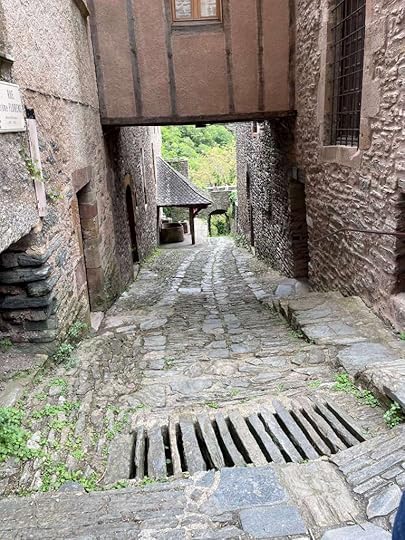
Note the stone drain.
Stonemason’s humour. One of the characters in my novel is a cathedral stonemason.

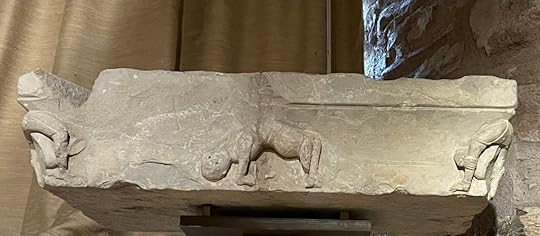
Medieval yoga perhaps?
I’ve returned home to writing with lots of inspiring material. Love’s Knife is being serialised a chapter a week on Substack.
May 26, 2024
Female Lords in Medieval Occitania
‘In the 11th to 13th centuries, in the Occitan-speaking territory of what is now known as southern France, a significant proportion of lords—10 to 12%—were women.’
Head to France’s Splendid Centuries Facebook page to read my guest post on Female Lords in Medieval Occitania.
I am presenting a talk on Almodis de La Marche, countess of Toulouse and Barcelona, and her two sisters, Raingarde of Carcassonne and Lucia of Pallars Sobira, as part of the Occitan University on Friday 19 July, 9pm at Château de Saint-Martin-Laguépie, 81170, France.
I’m also running a ‘Be Your Own Troubadour’ workshop with Occitan singer, Amandine Rey on Thursday 18 July and Friday 19 July 11am-1pm both days.
More information: http://www.lengaviva.com
https://www.facebook.com/groups/21846609750/user/100076116229213/
or contact me at info@meandabooks.com
Cover image: Seal of Garsenda, countess of Falcalquier in her own right and countess of Provence by marriage. Drawing: Louis Blanchard.
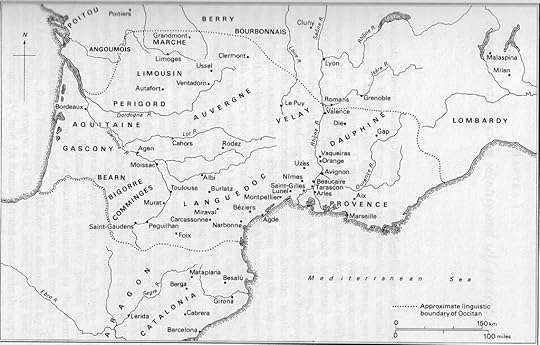 Map of Occitania (Source: Paterson, 1993).
Map of Occitania (Source: Paterson, 1993).
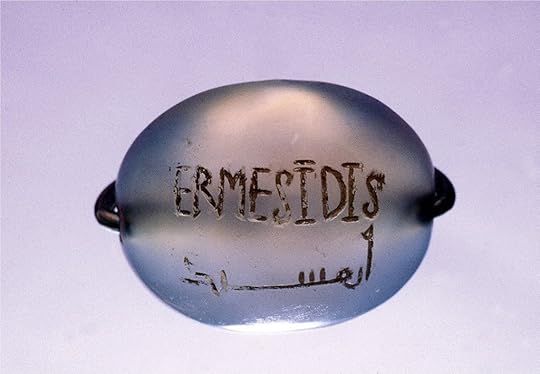 Seal of Ermessende of Carcassonne, giving her name in Latin and Arabic. In the treasury of Girona Cathedral.
Seal of Ermessende of Carcassonne, giving her name in Latin and Arabic. In the treasury of Girona Cathedral.
 Lucia de la Marca, 11th-century regent countess of Pallars Sobira in Catalonia. She came from La Marche in France. She commissioned this life-size fresco of herself for the chapel of Sant Pere del Burgal in the Pyrenees. The original is now in MNAC in Barcelona.
Lucia de la Marca, 11th-century regent countess of Pallars Sobira in Catalonia. She came from La Marche in France. She commissioned this life-size fresco of herself for the chapel of Sant Pere del Burgal in the Pyrenees. The original is now in MNAC in Barcelona.

April 25, 2024
Be Your Own Troubadour
As part of the Occitan University in Laguépie, France, I am giving a workshop and presentation:
Workshop: Tracey Warr and Amandine Rey
Be Your Own Troubadour
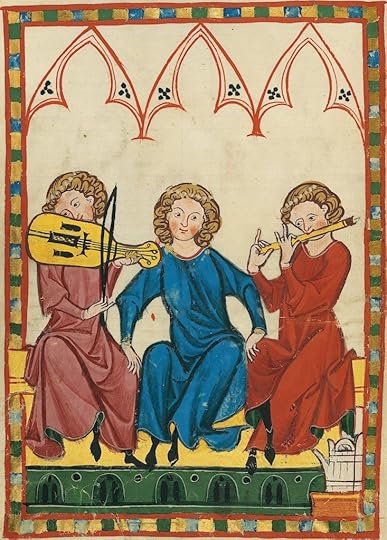
Thursday 18 July and Friday 19 July
10am-12 noon
Salle des Fetes, Laguépie 82250
60 euros, In French, English and Occitan
Learn about troubadour vidas (introductory, often boasting, biographies), tensos (debate songs, usually between a man and a woman about love), and cansos (love songs) and create your own. You can work in Occitan, French or English. If you wish, you can sing or read your creations on Friday 19 July 9pm at the Chateau. Places are limited. To book email traceykwarr@gmail.com
Presentation: Tracey Warr in conversation with Amandine Rey
Three Female Lords: The 11th-Century La Marche Sisters
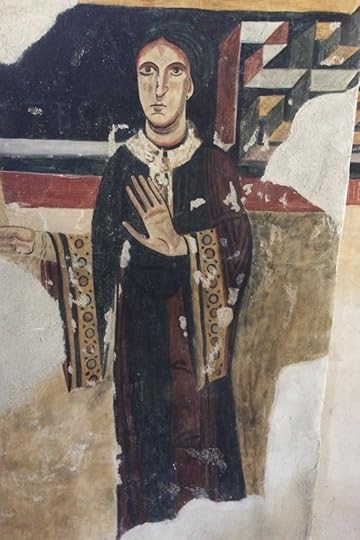
Friday 19 July, 9pm
Château de Saint-Martin-Laguépie, 81170
Free, In French and English
Tracey Warr talks with Amandine Rey about the three La Marche Sisters, Almodis, Countess of Toulouse and Barcelona; Raingarde, Regent in Carcassonne and Lucia, Regent in Pallars Sobira in the Pyrenees. Almodis was kidnapped from the count of Toulouse by the count of Barcelona and excommunicated for her marriage in Barcelona. William of Malmesbury accused her of being ‘afflicted with a godless female itch’. When her sister’s husband and then son died, she purchased Carcassonne from her for Barcelona. A presentation exploring the actions and motives of these three female lords.
Tracey Warr is a writer based in Laguépie. Amandine Rey is a singer and Occitan teacher living in the Lot Valley.

https://www.facebook.com/groups/21846609750/user/100076116229213
April 22, 2024
New Medieval Mystery on Pre-Order Now
I’m very excited to announce that my new novel, Love’s Knife, is on pre-order on Amazon now and will be published on 2 September.
This is my first new fiction book since the pandemic lock-downs and a serious bout of writer’s block, so I’m delighted to be writing, publishing and meeting readers again.
The ebook pre-order is up now and the paperback will be up soon. Love’s Knife is the first in a new medieval murder mystery series – the Trobairitz Sleuth series.
Beatriz de Farrera is a trobairitz (a female troubadour) under the patronage of Lady Philippa, heiress of Toulouse. In the tense power plays swirling around Lady Philippa, murders start to occur. Beatriz has to use her listening and deduction skills to solve the crimes, assisted by the keen observations of her deaf friend Anna. The series is set in late 11th- to early 12th-century southern France and northern Spain.
You can read the prologue for Love’s Knife by signing up as a free subscriber to my Substack.
I am currently releasing a chapter a week from Love’s Knife on Saturdays on Substack. Subscription is £5 per month. This week, Chapter 12 is released. Paying subscribers receive access to the archive of previously released chapters, the new weekly chapters and a free ebook or paperback when the serialisation is completed in August.
March 22, 2024
Chapter 7: The Red Dress
‘The sky was beginning to darken, and the fortified tower houses of the Toulouse nobility were stark, crenellated silhouettes all around the basilica close as Beatriz emerged from the sculpture workshop. Moving toward the path, she noticed a woman wearing a brilliant red dress, standing framed in the tall ground-floor window of one of the tower houses. The woman had her back to the window, exposing the intricate lacing of her dress, running from low in the small of her back up to the nape of her neck. Candlelight blazed from the window and projected out onto the ground at Beatriz’s feet. Dusk was gathering the last light like the slow sweep of a raven’s wing. A man in dark clerical garb came up behind the woman and Beatriz could only see his back too. Delicately and slowly, he unlaced the dress, and Beatriz watched the looping movements of his hands, mesmerised, thinking of Lluis’ hands. It was near full dark now and she reluctantly turned away to hurry back toward the chateau. The city gates would be closing soon, and the curfew bell would ring in an hour or so.’
Love’s Knife, Chapter 7
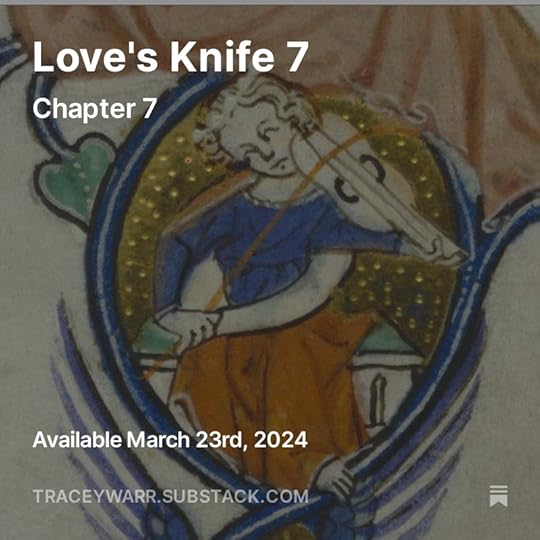
It’s not too late to catch up with my new novel, Love’s Knife, now being serialised with a new chapter every Saturday morning on Substack.
https://traceywarr.substack.com
Paying subscribers (£5 per month) receive the weekly chapters and have access to the back catalogue of previous week’s chapters. You will also receive a free ebook or paperback of the book on completion. It will be published on 3 September.
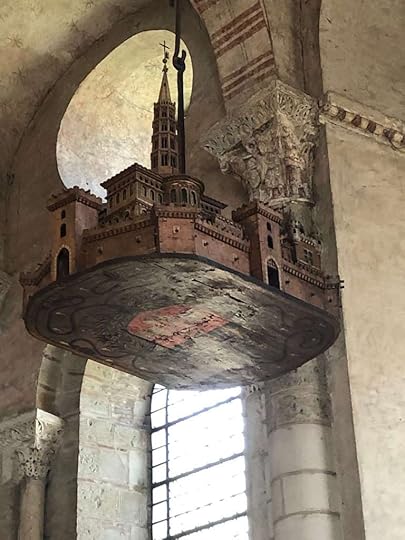 A model of Saint-Sernin Basilica, suspended in Saint-Sernin, Toulouse
A model of Saint-Sernin Basilica, suspended in Saint-Sernin, ToulouseOr you can become a free subscriber and receive fortnightly posts on my research for the novel.
March 8, 2024
Small Acts of Literary Kindness
Today is the 7th birthday of the Book Fairies who annually coordinate acts of literary kindness around the world. Two of my books – one in French and one in English – will be hiding, waiting for you to find them, in the French village of Laguepie 82250 on Sunday 10th March. Clues to their whereabouts will be coming on Sunday morning.

Meanda is a future fiction novella in French, set on a watery exoplanet. (An English version is available in The Water Age and Other Fictions.)
Almodis tells the story of an 11th-century countess of Toulouse and Barcelona. This book is in English.
If you can’t get to Laguepie, or someone beats you to the book, you can find all my books (ebooks and paperbacks) on the usual retail sites. Full details and purchase links: https://meandabooks.com.

Performing Online
A few years ago, back in the pandemic lockdowns, Martin Shaw, Emma Bush, Bram Thomas Arnold and I were teaching a Poetics of Imagination MA course online with 28 students. In one of my sessions, we performed Dylan Thomas’ Under Milk Wood. It was great fun and a brilliant way to enjoy Thomas’ marvellous language and this delightful radio play. One of the students, based in Canada, provided sound effects. Other performers were based in the US, Turkey, France, Wales, England, and Scotland. Due to all the various voices, I had to undertake quite a lot of preparation to make it work. It was amazing to be an international ensemble revelling in the humour and poetry of Under Milk Wood. Some people spoke in lovely Welsh lilts and hidden dramatic talents were revealed!
I’m organising the Historical Novel Society UK conference this September and we are running a series of online pre-conference sessions. Leslie Carroll, an actor and writer, is offering the opportunity to find out about adapting work for the stage. If you fancy performing from scripts based on Ivanhoe and The Prisoner of Zenda, join us!

March 7, 2024
Happy World Book Day!
My grandsons went to school this morning dressed as Harry Potter and Little Lamb – their current favourites. I am delighted that they are avid readers.
Image: Shakespeare and Company Bookshop, Paris



